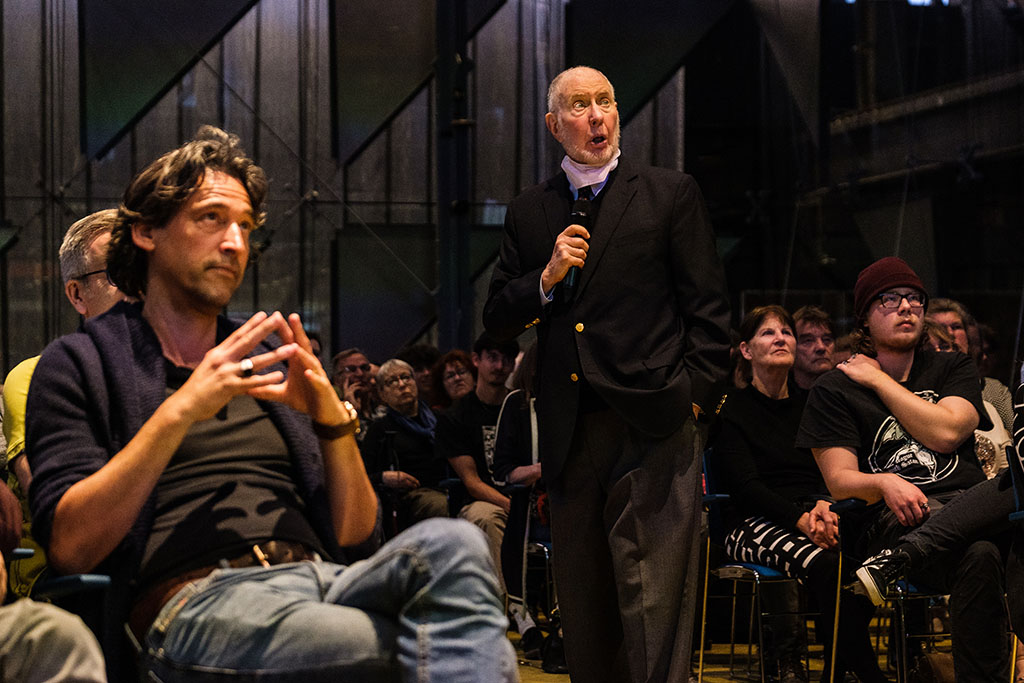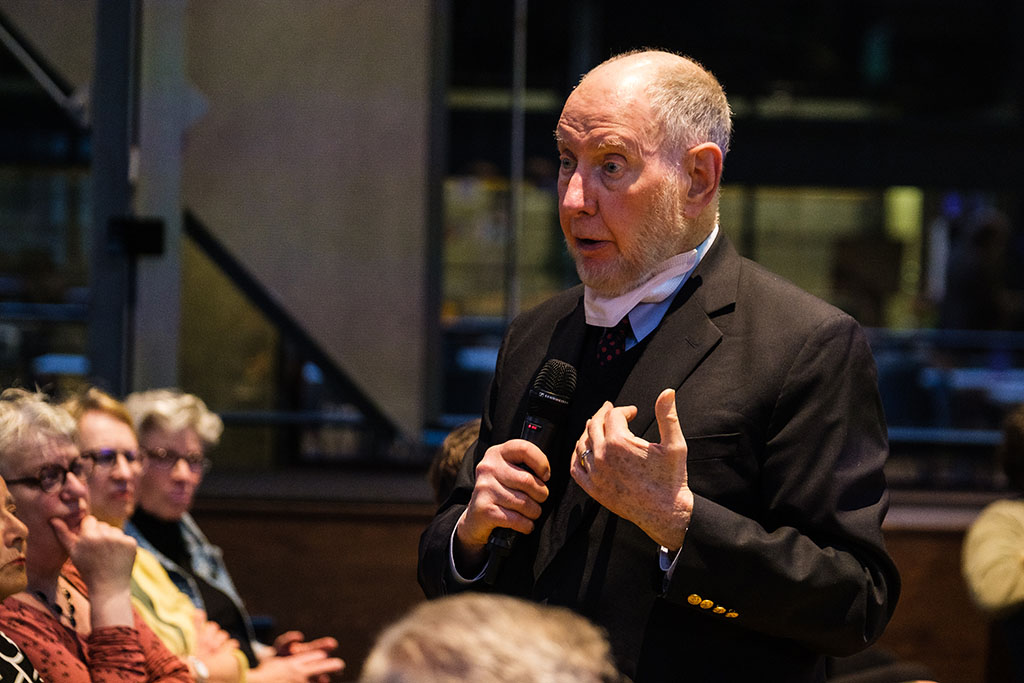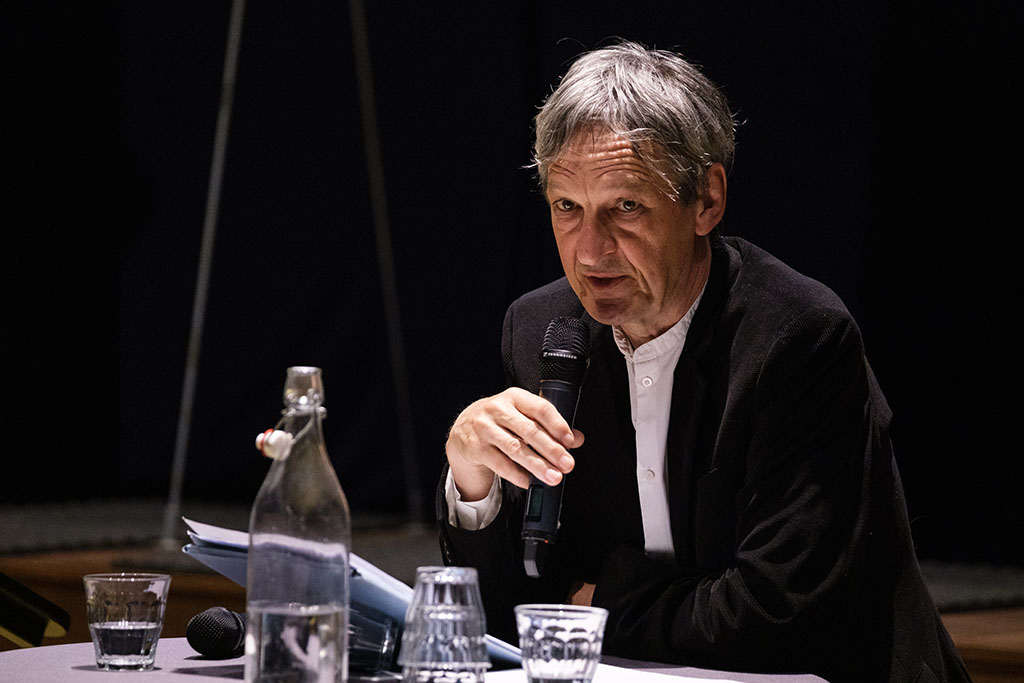The Tilburg Night of Philosophy was a fruitful evening full of stimulating reflections
Intimacy and strangeness: two words that at first seem incompatible. Yet Intimate Strangers is the theme of this year’s Month of Philosophy. A subject that loosens tongues as became clear during the Tilburg Night of Philosophy. It was a fascinating evening, where topics such as love, sexuality, friendship, and truth were discussed. Univers was there and discusses two highlights.

It was busy at the LocHal, where philosophers and philosophy enthusiasts gathered. For the most part, the evening consisted of eight lectures spread over two rooms. In the smaller room, called the Workshop, Tilburg University philosophers spoke. Maureen Sie and Stefaan Blancke spoke about the irony of free will and Herman de Regt held an impassioned plea about the value of the scientific method.
In the larger Glazen Zaal there were speakers from outside Tilburg, such as philosopher Jan Drost, whose fluent account of love was thought-provoking. The language games of poet and word artist Maud Vanhauwaert also appealed. But before Drost and Vanhauwaert took the stage, it was the turn of two great thinkers.
Upswing
One of these two thinkers was Robert Putnam, prominent American sociologist known for, among other things, his book Bowling Alone. As the first speaker of the evening, he came to talk about his new book Upswing, which addresses the orphaned society that is the United States today. But more than that, it is a story of hope.
“America is in a pickle,” Putnam opens the lecture, referring to the fact that his country is in bad shape. There is more economic inequality and political polarization than ever before; Americans have never been so socially isolated, and cultural self-centeredness is experiencing its heyday, Putnam said. There is, in short, an enormous lack of community spirit within the country.

Using several slides, he shows that his country was at this low point before—at the end of the 19th century. At that time as well, the United States was in bad shape and people were incredibly individualistic. But in the years that followed, Putnam shows, there was a major upswing in community spirit, peaking around 1960. This represents a seventy-year flowering of the collective. Then began the downward trend that continues to this day.
What did the Americans of that era do to make the sense of community so resurgent? The answer, according to Putnam, begins not with economic progress but with a change in moral attitudes among citizens themselves. Starting in 1890, Americans began to become aware of their own morality and the values that went with it. They began to think about what they owed to each other and realized that they did not want to live in a world dominated by the law of the jungle.
Another noteworthy aspect, says Putnam, is that this change was driven by young people. This group still thinks outside box, while older generations would no longer have this flexible thinking ability. Finally, the turnaround is said to have originated from local innovations, so-called grassroots movements. People did not wait for government intervention and took matters into their own hands by setting up associations and organizations. Charismatic leaders like Theodore Roosevelt only appeared on the scene when the social movements were already in full swing.
Putnam thinks we should draw our lessons from these pages of American history. He is convinced that if we do so, the United States—and to some extent this also applies to the individualized Netherlands—can achieve such a flourish again. One thing, he believes, is clear: solutions must come from the citizen.
Intimate strangers
Putnam was relieved by Paul Verhaeghe. The Belgian psychoanalyst had the honor of writing the essay Intimate Strangers for the Month of Philosophy this year. During his lecture, Verhaeghe took extensive time to explain to his audience why the words intimacy and strangeness—despite their definition – fit together very well. With a reference to Freud’s concept of das Unheimliche, Verhaeghe set the tone of his lecture: “That which seems familiar and intimate to us can also feel strange at the same time.”
Verhaeghe states that two different kinds of primal forces (energies) reside in every human being. First, one knows the need for intimacy that makes us want to be close to the person we love. Freud called this the eros drive. Individuals find their ultimate happiness when they can merge with a loved one. This can sometimes be very recognizable, Verhaeghe explains: “For example, everyone knows the saying ‘I think you are scrumptious.’ It is a striking statement because two people merging into each other is literally named here”.

Another tangible example of the eros drive, according to Verhaeghe, is the human search for an “other half”: “The expression “other half” more or less presupposes that two individuals can merge into one unit.
But there is also a danger in this desire. People can become completely absorbed in their relationship, as a result of which there is not so much left of the individual. To support his thesis, Verhaeghe wonders aloud how many people have lost sight of a good friend after they started a relationship.
In addition to the need for intimacy, humans also have an extreme desire for autonomy. “Nothing is more familiar to humankind than the need to want to do his/her ‘own thing,'” explains the psychoanalyst. This is a need in which humans want to isolate themselves from their environment. But this so-called Thanatos drive, according to Verhaeghe, is wrongly understood as an aggression drive. Many, he says, have misinterpreted Freud’s work: “Despite the fact that thanatos means ‘death’ in Ancient Greek, Freud never claimed that dying is an ultimate goal of life.”
According to Verhaeghe, the situation is different: “The eros drive creates a great field of tension that is fed by the need to be with someone. The thanatos drive, on the other hand, wants to turn its back on this merge. The friction of these conflicting energies causes a discharge in which all the built-up tensions are released. According to Freud, with the inevitable result that the organism dies.” Death, according to Verhaeghe, is therefore not a goal but an inescapable consequence.
Not everyone immediately understood what Verhaeghe meant by this. When asked if he could explain this principle again, he replied, “Sex is a clear example of this theory. During sex, energies are built up and exchanged. This ultimately results in a discharge of all tensions. After this discharge, everything is over. Does the ‘orgasm’ mean anything to you?”. An explanation that everyone in the room understood immediately.
Strangeness and intimacy; words whose definitions—thanks to Verhaeghe’s lecture—are more compatible than ever before. Who would have ever thought that?
Translated by Language Center, Riet Bettonviel






